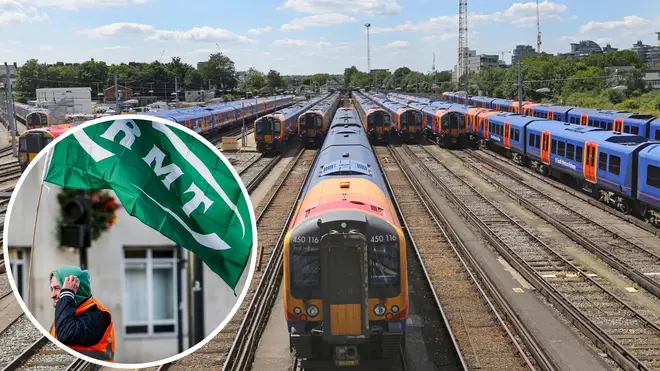
Clive Bull 1am - 4am
20 April 2022, 15:14 | Updated: 20 April 2022, 15:19

Holidaymakers could see their plans thrown into chaos this summer as unions threaten the biggest rail strike in modern UK history.
More than 40,000 railway workers are to be balloted in a dispute over jobs and pay, with strike action possible as early as June.
The Rail, Maritime and Transport (RMT) union ballot opens on April 26 and closes on May 24.
The 15 affected train services include Chiltern Railways, Cross Country Trains, Greater Anglia, LNER, East Midlands Railway, c2c, Great Western Railway, Northern Trains, South Eastern Railway, South Western Railway, Island Line, GTR (including Gatwick Express), Transpennine Express, Avanti West Coast, and West Midlands Trains.
The RMT said Network Rail is planning to cut at least 2,500 "safety-critical" maintenance jobs as part of a £2 billion reduction in spending on the network, while workers at train operators have been subject to pay freezes and changes to their terms and conditions.
READ MORE: Belligerent Boris clashes with Sir Keir at PMQs saying he 'humbly accepts' Partygate fine
READ MORE: Workers who stayed behind at Ukraine zoo to help animals 'shot dead by Russians'
RMT general secretary Mick Lynch said removing the jobs would "spell disaster for the public, make accidents more likely and will increase the possibility of trains flying off the tracks".
He added: "Train operating companies have praised our members for being key workers during the pandemic but have refused to keep staff pay in line with inflation and soaring living costs.
"As a result, thousands of railway workers have seen their living standards plummet and have run out of patience."
Tim Shoveller, Network Rail's regional director, said: "Our railway has been hit hard by the Covid-19 pandemic, and even as passenger numbers start to recover, we know travel habits and passenger demand have changed and the industry has to change too.
"We cannot keep relying on Government handouts, and so we must work together with train operators and our trades unions to save millions of pounds and deliver a more efficient railway."
A Rail Delivery Group spokesman added: "The pandemic was an unprecedented shock for the railway, with the lowest passenger numbers in over 150 years and record levels of public funding to keep it running.
"Our whole focus now should be securing a thriving future for rail that adapts to new travel patterns and takes no more than its fair share from taxpayers, instead of staging premature industrial action which would disrupt passengers' lives and put the industry's recovery at risk."